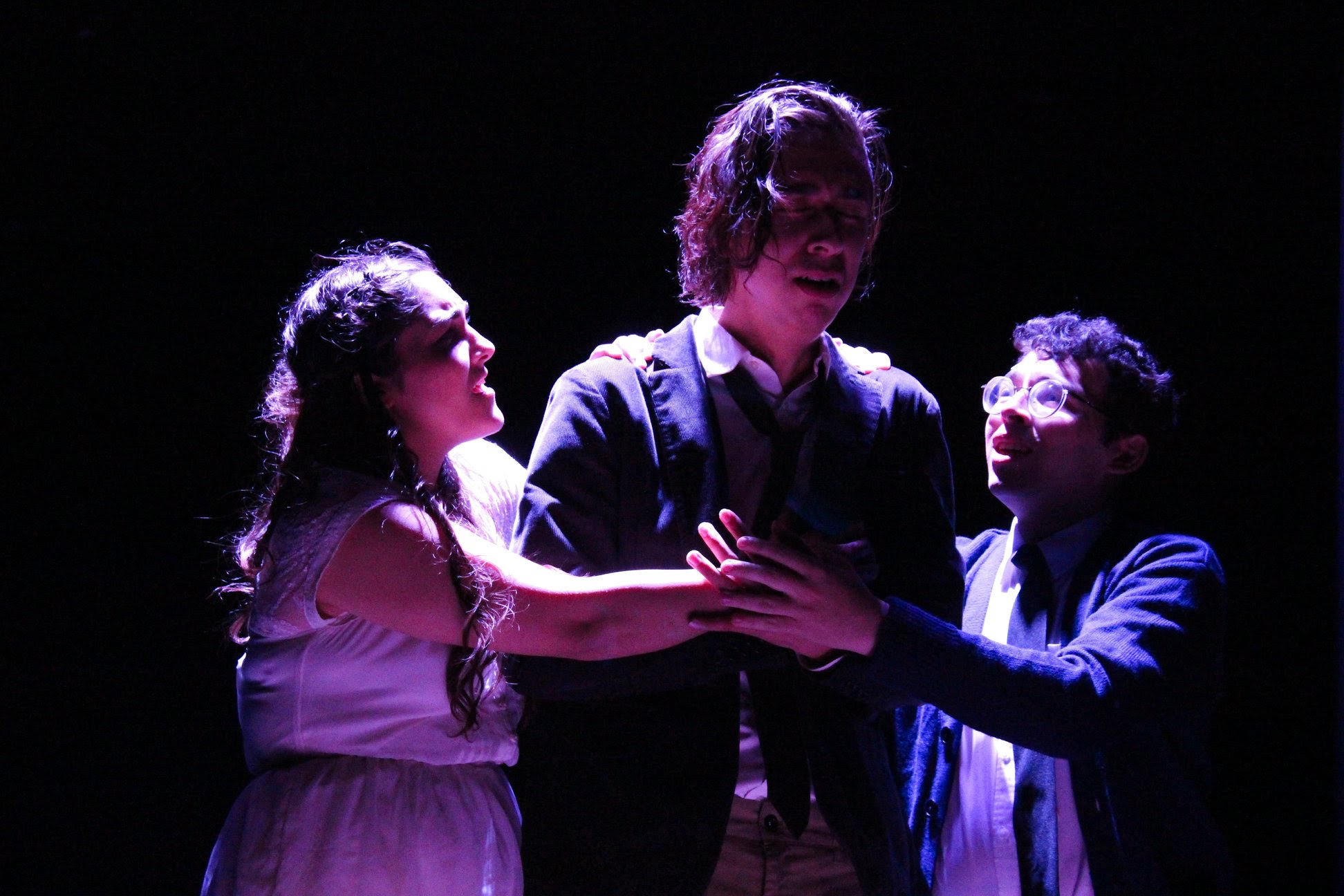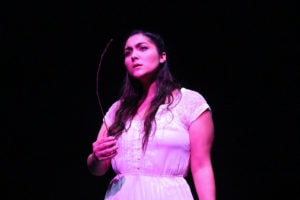It is a joyful occasion when a new, vital theater company opens, and the advent of Boundless Theatre in Frederick is a welcome addition to the Western Maryland arts scene. Their inaugural production of Steven Slater and Duncan Shiek’s Spring Awakening is a highly promising beginning.

Adapted from an 1891 German play by Frank Wedekind, the coming-of-age musical drama has a Manichaean flavor. Teenage youth: soulful, loving, open-hearted, emotionally confused, intellectually curious, sexually blossoming, careless, full of hope and energy, victimized. Adults: tyrannical, abusive, clueless, condescending, hypocritical, closed-minded, punitive, and hard-hearted (and, for some reason, the only characters in the production using German accents).
Since its 2006 New York debut, Spring Awakening has typically been staged with the
19th-century characters grabbing hand mics and singing their songs in pop/rock concert style, straight out to the audience. Here, director Jacob Young made the innovative choice of discarding the hand mics, having the actors integrate their songs more closely with the action. It works wonderfully, creating greater focus on the songs as expressions of character and having a far less performative effect.
The show’s lead, Melchior (Jhonny Maldonado), is an intellectually precocious lad who sees clearly through the hypocrisy of adults, religion, and society in general, though he remains something of a rebel without an effect. What most preoccupies him and his friends is sex. Melchior shares his book knowledge of the subject with his nerdy, insecure friend Moritz (Danny Santiago).
For much of the first act, Maldonado chooses to keep Melchior rather quiet, low-key, and intellectually detached, giving the character room to grow in passion, and ultimately, sadness. He is versatile vocally, succeeding both in quiet moments like the elegiac “Left Behind,” and energetic production numbers like “Totally Fucked.” Santiago takes the overwrought nature of his character a bit over the top at times, but gives songs like “And Then There Were None” and “Don’t Do Sadness” a strong rock vibe.
The extremely innocent Wendla (Marissa Kovach), Melchior’s love interest, does not know where babies come from, and her opening song, “Momma Who Bore Me,” is an unsuccessful attempt to elicit this information from her mother. Kovach delivers this number, as well as “The Word of Your Body,” a gentle duet of innocent lust with Melchior, and “Whispers,” with a clear, lyric soprano sound.

The supporting cast is also strong. Hanschen (Randy Stull) and Ernst (Christopher Livingston) have a moment of exquisite tenderness in their second act reprise of “The Word of Your Body.” Ilse (Katie Gerard) shows not only a lovely mezzo voice in “Blue Wind” but the ability to capture many facets of a character in a relatively small number of lines. She joins with Martha (Tobi Baisburd) in the devastating “The Dark I Know Well.” Its psychologically acute lyrics express as well as anything I have ever heard the feelings of physically and sexually abused girls, their emotional deadening as they “lie there and breathe” serving as a survival mechanism.
This brings up a technical problem in the production’s opening performance, episodes of imbalance between Kathryn Bailey’s excellent band and the singers. Especially in the first act, the band’s volume covered the singers at some points to the extent that lyrics – including some of those in “The Dark” – could not be heard clearly in the house. At times, Spencer Morgan’s lighting design seemed to leave a number of cold spots in which actors had to deliver lines or songs, as well as presented a seemingly random roving spotlight.
Whether from the resource limits of a start-up group or just good artistic sense, Young staged the show on a very minimalist set, consisting of a few chairs and other pieces of furniture that actors re-positioned from time to time. Like jettisoning the hand-held mics, this had the effect of focusing the audience’s attention where it belonged, on the actors.
Two actors (Nancy Jones and Andrew Baughman) play all the unsympathetic adult roles. Baughman differentiates his various characters more effectively than Jones does hers, but the overall point of having one actor play all the adult male or female roles is inescapable: adults are essentially all the same, pernicious cogs in what Melchior calls the “parentocracy.” As the 1960s slogan had it, “never trust anyone over 30.” (Wedekind was 27 when he wrote the original play.)
In ensemble numbers like “My Junk,” “Touch Me,” and, best of all, “Totally Fucked,” choreographer Kat Cardenas-Cruz has the ensemble moving with great energy, in a way that is well-coordinated but not regimented, leaving room for individual physical expression within the context of the overall shape of the number. The finale, “The Song of Purple Summer,” led by Ilse, brings the entire cast together (including the adults, singing for the only time in the show) to express a degree of hope in the face of tragic circumstances, doing for late 19th-century German kids something like “Let the Sunshine In” does for their 20th-century American counterparts at the conclusion of Hair.
This is a production well worth seeing, though its brief run ends with matinee and evening performances on Saturday, April 20. Boundless Theatre hopes to mount two or three shows annually, offering local theatergoers something good to look forward to for the 2019-2020 season.
Running Time: Two hours and thirty minutes with intermission.
Spring Awakening plays through April 20, 2019, presented by Boundless Theatre at the New Spire Stages, 15 West Patrick Street, Frederick, MD. For tickets, go online.




